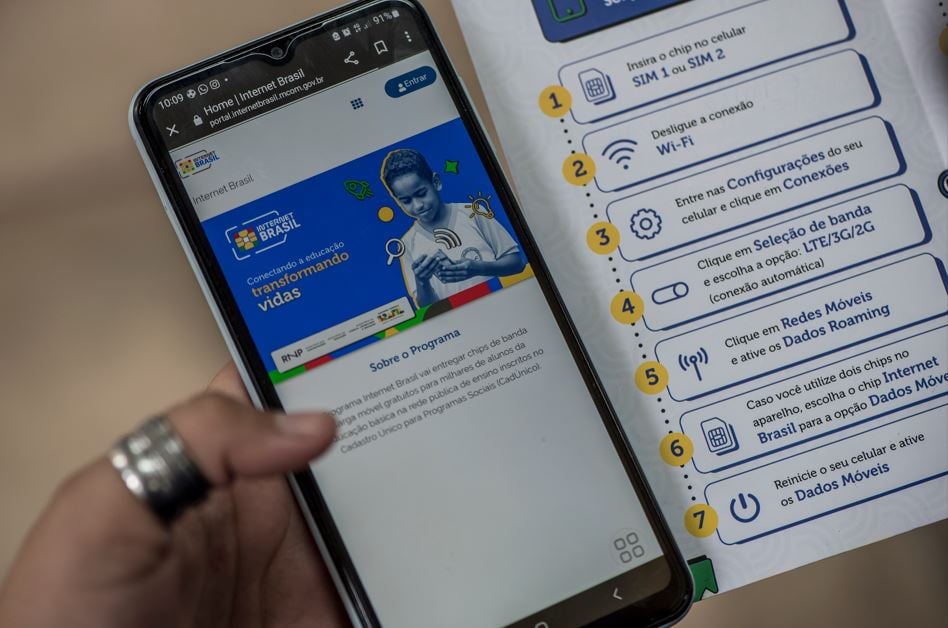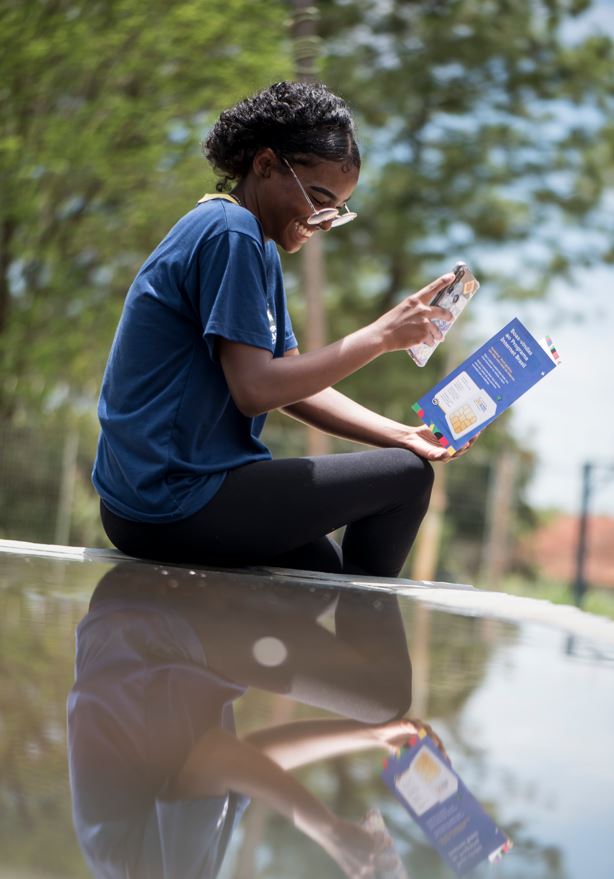Internet Brasil completes initial phase with 10,000 broadband chips delivered to students registered with CadÚnico
Event at a public school in Uberaba (MG) marked the last delivery of the pilot phase in nine municipalities; program that democratizes internet access will gain scale in 2024
Maria Eduarda, 10, wants to use the internet to research animals and plants. Vitória, 13, will watch videos and answer questions about mathematics and geography. Eduardo, 10, wants to discover new games and have support with his tasks. Emily, 14, wants to research architecture and administration videos, potential professions in the future, as well as keeping in touch with friends and family.
These students are from Anísio Teixeira Municipal School, in Uberaba (MG), one of the 11 included in the delivery of 1,726 mobile broadband internet chips at the end of November. The action is part of the Internet Brasil program, an initiative by the Ministry of Communications (MCom) with support from the Ministry of Education (MEC) which plans to expand connectivity to 700,000 public school students registered with CadÚnico (single registry for federal government social programs).
Executed by RNP (National Education and Research Network), Internet Brasil concluded, in Uberaba, the delivery of the 10 thousand chips foreseen in the Proof of Concept. This step works as a pilot for the entire program. In total, nine municipalities participated in this phase, which began at the end of 2022. Now, the program will enter a new phase from 2024 onwards – with 50,000 new chips expected to be distributed at the beginning of the next academic year.
The milestone was celebrated at an event on Thursday (November 30), with the presence of parents and students in the Anísio Teixeira auditorium. On the walls, students placed balloons and posters with phrases reflecting the expectations generated by the possibility of internet access, such as “Education and technology in the construction of knowledge”.
For Pedro Lucas Araújo, director of the Investment and Innovation Department of the MCom Telecommunications Secretariat, the results of the initial chip distribution phase guarantee the expansion of the program.
“Our intention is to grow quickly, and we had to be sure that we could deliver many chips quickly”, he explains. “The event in Uberaba is the last mass distribution test and concludes the Proof of Concept stage, the program’s pilot project. This means that we now have the inputs, information and experience necessary to expand Internet Brasil starting next year”, he celebrates.
He defines RNP's participation as fundamental in this process. “RNP combined two conditions: it already had experience in the field with chip distribution, but for higher education students. Another point is that we are using schools as distribution channels. And RNP also had experience with education departments in the context of school connectivity actions”
How does Internet Brasil work?
The program provides that students will have free access to a chip with up to 20 GB of mobile internet data per month. Another difference is the use of neutral chips, which allows RNP to remotely define the operator to be used. This way, the program is not dependent on a contracted company (and, consequently, on their chip), and can connect to the most appropriate 4G network in each region.
Suely Campos, Solutions coordinator at RNP, says that the model allows access to the best internet connection for the benefiting students. “Given the difficulty of obtaining the best connectivity signal with a given operator, it is possible to change without discarding the current plastic chip.”
For her, the current results confirm that expansion is viable. “The next step will be to start providing services to the other education departments that must participate in the program, in addition to expanding Internet Brasil to serve the target audience of community health agents and those fighting endemic diseases,” she says.
The objective is to expand digital inclusion in the country
It is no coincidence that among the students who benefited, many will have internet available on a daily basis for the first time, and others will be able to expand their access.
“Having this free internet makes it a lot easier, as we can’t afford to pay every month. I'm unemployed and I have very limited internet”, says Veridiane Alves de Paula, 35, mother of Lucas Gabriel, 12, benefiting from the program. “This will help me study,” he says, while showing the Internet Brasil brochure.
Francisco, 12, was waiting for the chip next to his mother, Sandra Costa, 48. “I already had a task where I had to do research and it was difficult”, says the boy. “He really likes math and science, and is very curious to learn. Today we have internet, but it’s very little.”
As soon as they received the chip, twins Eloá and Tainá, 11, ran to share the news with their colleagues. “It was a very big surprise,” said Eloá. “With the chip, it will be much easier for us to study”, added the sister. The two list Portuguese and mathematics as their favorite subjects – and also the most challenging.
For Ketally, 11, a 5th year student, the chip will make her tasks easier. She says that, at various times, she has had to ask her older brother to print extra activities that the teacher gives online. “Now I can just click on the link and do it”, celebrates her, who also wants to use the tool as support to look for images to draw and to contact her family.
Director foresees greater contact with families and organizes technological monitoring
According to director Edna Chimango, currently all classrooms already have Whatsapp groups. “Sometimes, the only contact with families is via the internet, because many do not have credit for calls. The chip will allow for greater contact, as well as increased learning,” she says, and sees other difficulties to be overcome.
“Our students come from a very vulnerable background. By receiving these chips and having the opportunity to access them, there is an expansion of knowledge”, adds vice-director and professor Camilla Bosco.
Controlling internet access must be done by parents, who sign a term of responsibility and authorization for the chip to be delivered by schools. The school, however, participates in this process as a support point – hence the interface with the teaching units. This is the case of Anísio Teixeira, who is already planning lectures on internet security for those benefiting from the delivery of chips. “In February, we want to carry out technological monitoring. We will train two to three students in each classroom to provide this support”, says the director.
The cell phone must be made available by the families themselves. The measure follows research that shows that a large part of the population already has access to devices, but has difficulty accessing the internet widely. “We deliver the chip to the student, but the purpose is for it to be the vector of digital inclusion for the family”, highlights Pedro Lucas Araújo, from MCom.
The distribution event was also marked by presentations on internet care, poetry reading and interactions with students. Some mentioned dreams for the future, such as being a football player, goalkeeper, lawyer, actress/actor and criminal expert.

